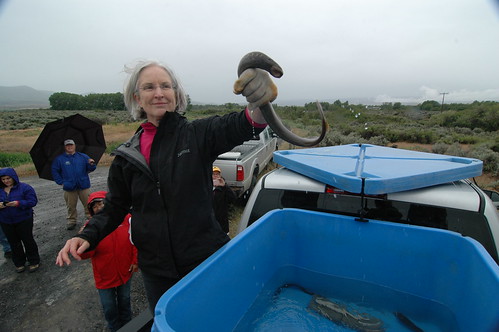
Recently, I visited the 1.1 million acre Yakama Nation reservation located in southwestern Washington State. Touring the reservation, I was able to see first hand how funds from the Regional Conservation Partnership Program (RCPP) will help the over 10,000 members of the Yakama tribe.
Through RCPP, NRCS is working with the tribe to accelerate the recovery of fish stocks, including the Middle Columbia Steelhead, reconnect floodplains and improve irrigation water conservation.
The lower tributaries of the Yakima River currently produce more than 50 percent of the wild steelhead population in the basin. Many Yakama people engage in ceremonial, subsistence and commercial fishing for salmon, steelhead and sturgeon in the Columbia River and its tributaries.
The RCPP project, Yakama Nation On-Reservation Lower Yakima Basin Restoration Project, will help ensure the Yakama can continue their livelihood. It will also benefit multiple other aquatic and riparian species, including chinook and sockeye salmon, Pacific lamprey, and important cultural plant species.
This is one of 115 conservation projects currently being funded by RCPP in all 50 states and the Commonwealth of Puerto Rico. Together, USDA investments and partner contributions have brought our total conservation investment through RCPP to almost $800 million – and we’re just getting started. Recently, Secretary Vilsack announced that the second round of RCPP funding is now available. A new round of $235 million in funding will be put to work on innovative new projects to benefit our soils, water, and wildlife.
This project is complementary to a second project, Yakima Basin Integrated Water Resource Management Plan Implementation, for fish recovery outside of the Yakama Reservation. Together the two projects present a comprehensive plan for addressing Columbia Basin resource concerns at the scale of the entire Yakima River Basin.
By also installing new irrigation piping, the reservation will see more than 840 acre-feet of annual water savings -- a savings of nearly 275 million gallons per year. These new pipes are a part of a 225-square-mile irrigation project, which will help save water and decrease the amount of sediments entering waterways.
Water savings are going to be even more important as we face droughts and long-term changes in hydrology. Projects like this one in Washington are enabling communities to be better equipped to handle drought and other extreme weather events.
By working together and forging these new partnerships we will better able to help our environment, our economy and improve our daily lives. We look forward to working with the Yakama Nation to improve this historic landscape.

